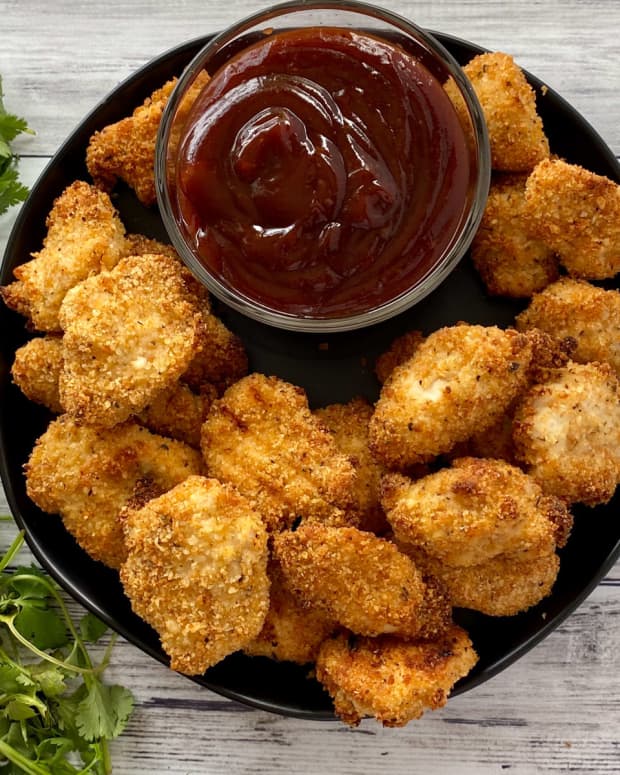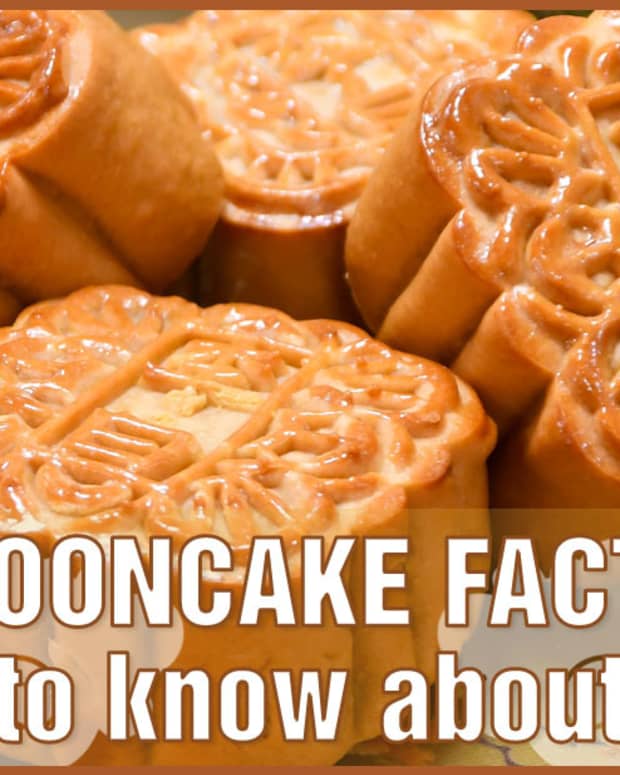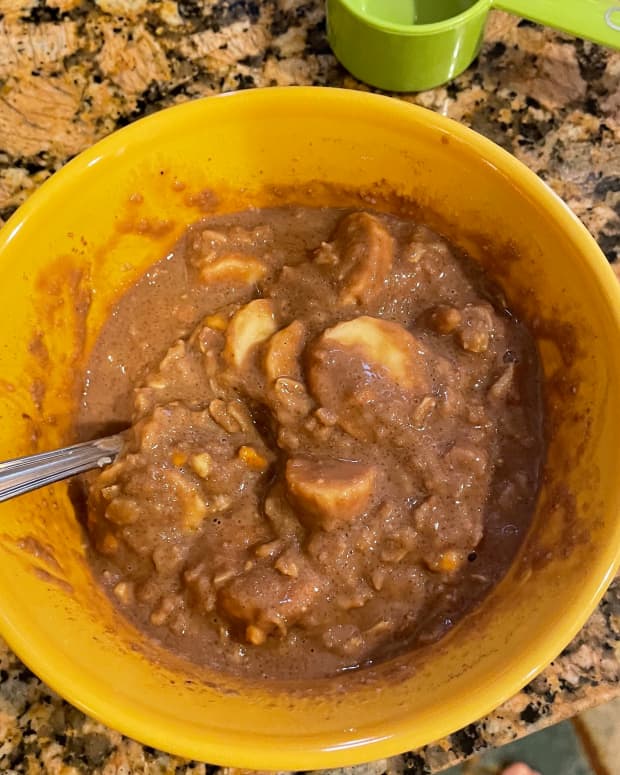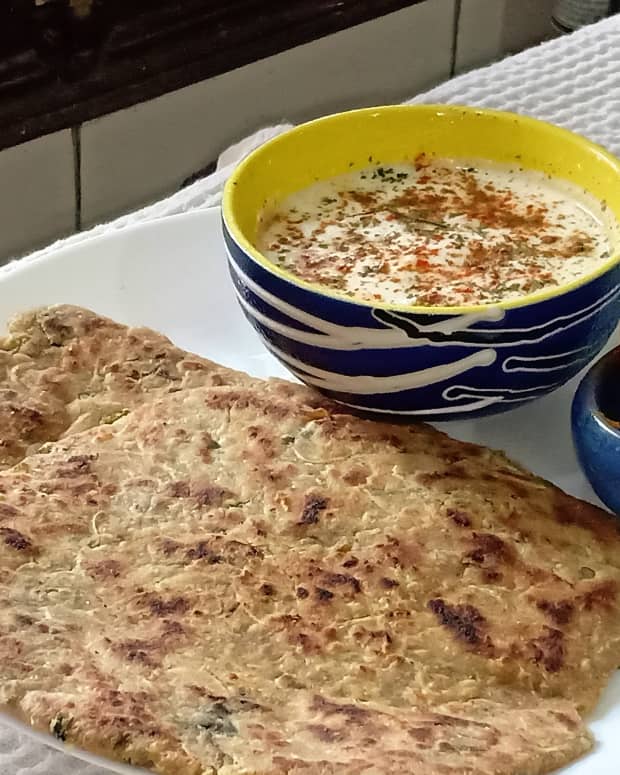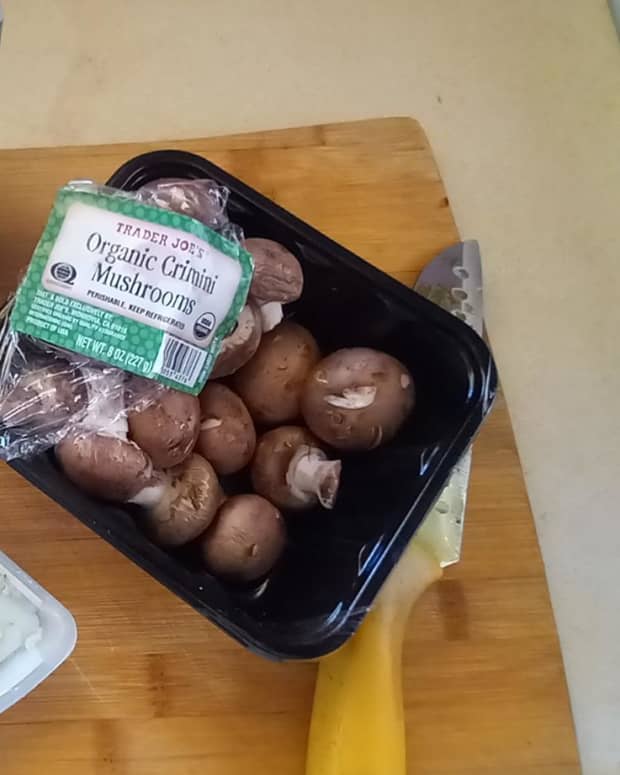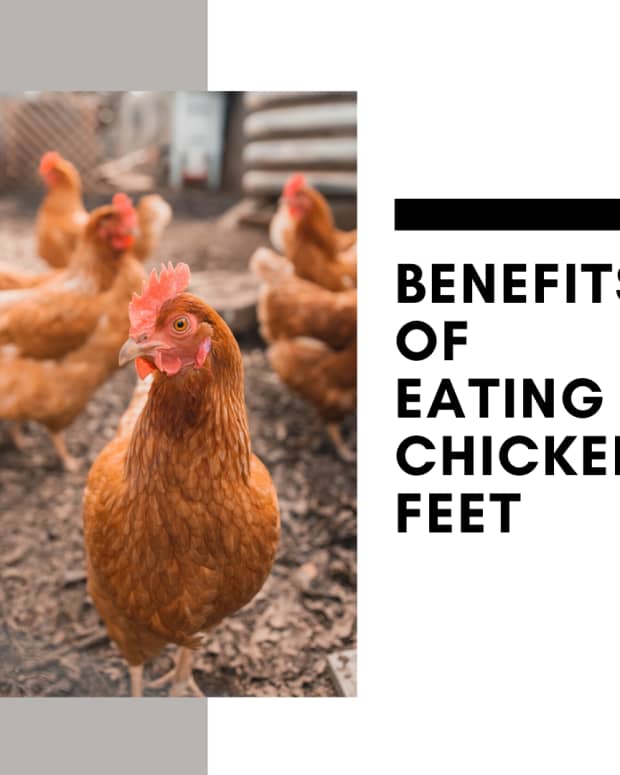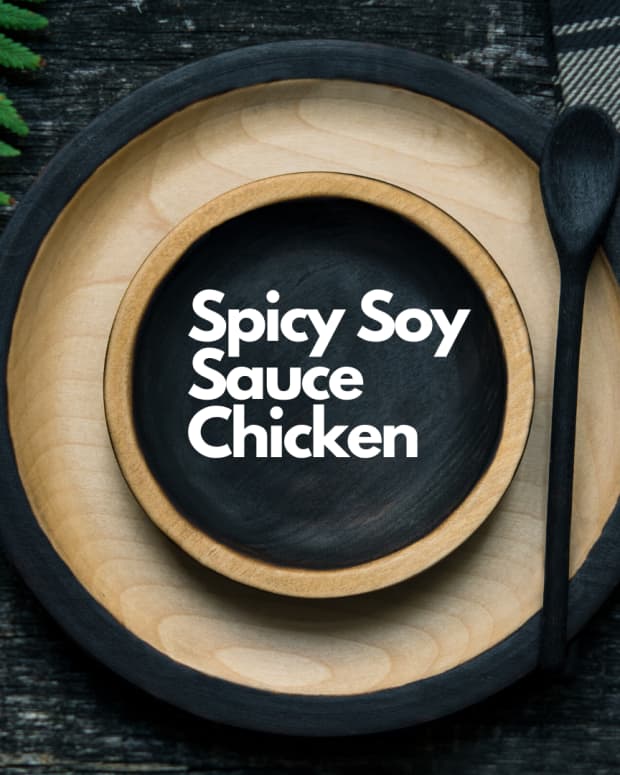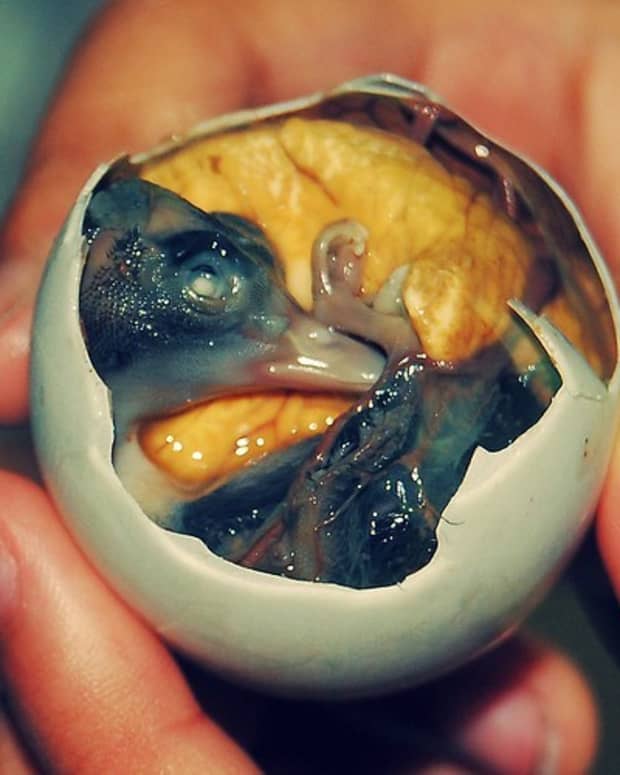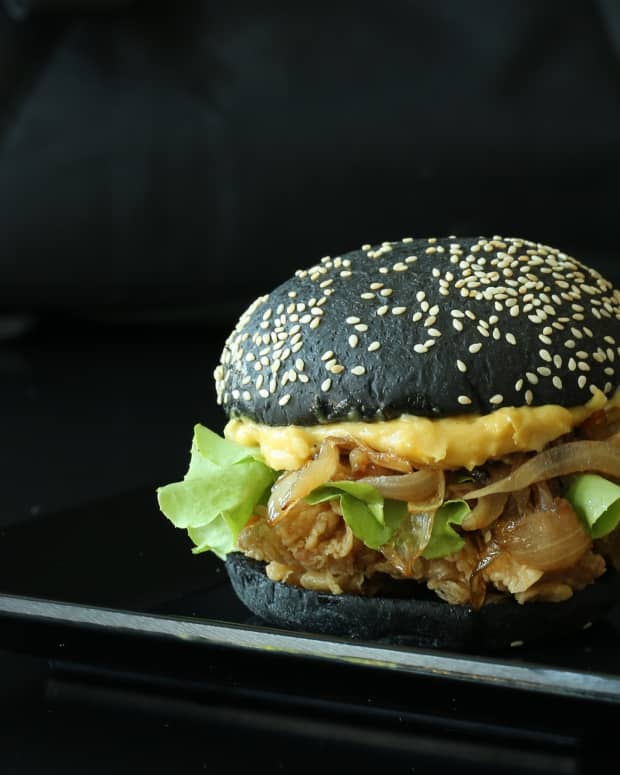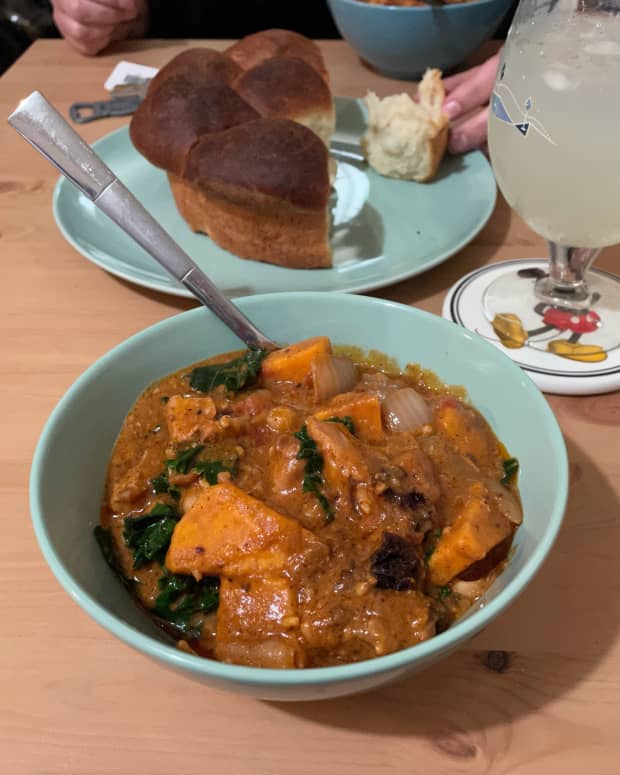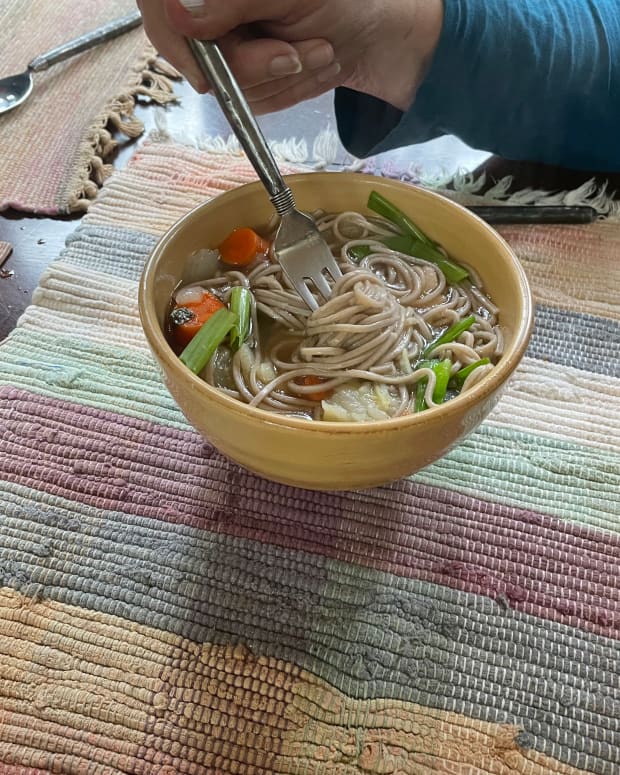Eating Insects or Entomophagy: Helping People and the Environment
Linda Crampton is a writer and teacher with an honors degree in biology. She loves to study nature and write about living things.
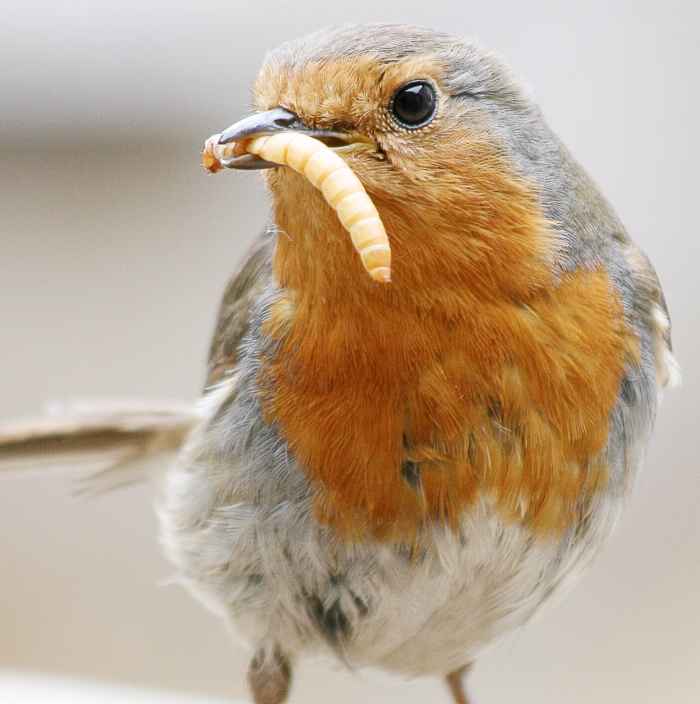
Mealworms are the larval form of a beetle. They are edible for humans as well as this European robin.
A Food That Is Rich in Protein
The idea of eating insects may sound repulsive to some people and mouthwatering to others. The animals are an optional part of our diet at the moment, but they may be required in the future. They are a protein-rich and nutritious food that can be produced with far fewer resources than traditional farm animals. Farming insects is also a much more environmentally friendly method of food production than other farming methods.
Many cultures and countries already eat insects, a process known as entomophagy. Deep-fried species are a popular snack in countries such as Thailand, Cambodia, and Vietnam, for example. Almost everyone else eats insects, too, although they may not realize this. Most foods obtained from plants contain tiny bits of insect bodies. These "enriched" foods include some vegetables, fruits and grains, peanut butter, spices, and chocolate.
Many experts say that a food crisis is looming. The Earth's population is continuing to grow, but the increase in the amount of food that is available isn't keeping pace. We will almost certainly have to turn to nontraditional sources of nourishment for at least some of our calories in the future. Insects are a prime candidate for one of these new types of food.
Entomophagy Today
Insects have been eaten by humans for thousands of years. It's estimated that today about 2 billion people eat insects as a regular part of their diet and that at least 1,900 different species of the animals are eaten. Examples of edible insects include some crickets, grasshoppers, locusts, cockroaches, beetles, termites, ants, bees, wasps, caterpillars, and mealworms. Bugs are widely eaten, too. In North America, the word "bug" is often used by the general public to mean "insect", but bugs are actually a distinct order of the class Insecta.
Humans eat all stages of an insect's life cycle—adults, nymphs (immature stages), pupae, and eggs. Not all of the life stages of a particular species may be edible, however. Today some insects are farmed, but in many countries wild varieties are caught by the local people. These may provide an important source of income.
Insects are sometimes eaten raw but are often cooked. Preparation techniques include boiling, roasting, grilling, and baking. Insects are also stir-fried, deep-fried, or added to porridge or rice. In many parts of the world today, the animals are considered to be a delicacy. The video below shows insects for sale at a Thailand food market.
Globally, the most consumed insects are: beetles (31 percent); caterpillars (18 percent); bees, wasps and ants (14 percent); and grasshoppers, locusts and crickets (13 percent).
— Food and Agriculture Organization of the United Nations
Feeding an Increasing Population
The United States Census Bureau, the United Nations, and FAO (Food and Agriculture Organization of the United Nations) have published some alarming information in relation to the production of food for humans.
- As of the first quarter in 2021, the world's population was over 7.7 billion people.
- The population is projected to reach 9 billion by 2050.
- More than 820 million people on Earth are chronically undernourished (as of 2019).
- Forests and grasslands in many parts of the world are being destroyed to make room for livestock.
- At the moment, approximately one third of the arable land on Earth is used for growing feed for livestock.
Professor Arnold van Huis is an entomologist at Wageningen University in the Netherlands. With reference to our increasing desire for meat, he's been quoted as saying "If we continue like this we will need another Earth".

The sight of a cow contentedly grazing in a field is becoming less common as factory farms become more abundant.
Problems Caused by Meat Production
Animal farming methods can cause big problems for the environment. These problems are becoming more serious because fields filled with free roaming livestock are disappearing in many parts of the world. Industrial or factory farming is taking over. In these operations, animals are crowded into enclosures and produce concentrated waste, runoff, and odour.
- According to FAO, 14.5% of the greenhouse gases created as a result of human activity are produced by farm animals. Greenhouse gases in the atmosphere absorb heat released by the Earth's surface and then radiate it back to the Earth.
- The main greenhouse gases released by livestock are carbon dioxide and methane.
- The huge factory farms that are becoming common use large amounts of energy and fresh water.
- Runoff filled with animal waste causes soil erosion.
- The runoff may contaminate streams, rivers, and groundwater.
- Pesticides used on livestock may also escape into the environment.
There is another way in which livestock may affect their human environment. Antibiotics are given to many farm animals to keep them healthy and to enhance their growth. There are concerns that the presence of these medications in meat is contributing to antibiotic resistance in humans.
Environmental and Economic Benefits
Insects are abundant on Earth. Of course, even abundant animals can face population problems as a result of human pressure. Insects can be farmed, however. They produce many offspring and have a high reproductive rate.
Economics
Raising insects for food has important economic advantages compared to raising traditional livestock. Unlike mammals and birds, insects don't use food to produce heat to warm their bodies. They are therefore very efficient at converting the food that they eat into tissue that can nourish humans. According to FAO, 2 kg of feed is needed to produce 1 kg of insect meat while 8 kg of feed is required to produce 1 kg of beef.
Environment
Farming insects also has environmental benefits compared to farming other livestock. Insects produce much smaller amounts of methane and other greenhouse gases than traditional farm animals. They also produce much less ammonia, a pollutant made by pig and poultry farms, and much less manure.
Nutritional Benefits of Eating Insects
Some people might think that farming insects is pointless because a huge number of the animals would be required to produce as much meat as one cow. Many nutritionists say that North Americans are eating far more meat than is necessary for their health, however. In fact, the ingestion of excessive amounts of red meat has been linked to health problems. The big, juicy steak may become a thing of the past sooner than some people would like.
Insects are a nutritious food source. An in-depth analysis of the nutrients in their bodies hasn't been performed, however. We can't find insects on the online nutrient databases that are available, although we may be able to one day. It is known that they are an excellent source of protein, though, as well as a great source of vitamins and minerals, including calcium, iron, and zinc.
Marcel Dicke is another professor at Wageningen University. In the video below, he outlines the benefits of eating insects. He raises the point that many of us enjoy eating shrimp, which are relatives of insects. He says that we need to change our mindset to appreciate alternate food sources.
An Edible Insect Poll
A Novel Food in North America
Giving people who have never eaten insects before a plate of whole animals to ingest is probably not the best strategy for encouraging entomophagy. Grinding the roasted animals into a powder and then mixing this powder with other foods may be. This is the strategy that some companies in the United States are using. They hope that the disguised animals will be more palatable than the intact ones.
The number of U.S. companies selling products made of edible insects has increased substantially since I wrote the first edition of this article. Crickets seem to be the insect of choice for the products. The businesses that I've investigated are advertising energy bars, chips (crisps), cookie mix, and protein powder made from cricket flour. The products have enticing flavours such as vanilla, chocolate, coffee, and peanut butter.
One company has called their snack products made from crickets "chirps". The name is amusing, but I wonder if it will backfire on the producers. People may not want to be reminded of living insects as they eat a snack.
Contamination of Foods With Insect Parts
People in North America already practice entomophagy to a limited extent due to the presence of insects in foods that come from plants. According to the University of California, an average American today eats an estimated two pounds of insect bodies and body parts every year.
The FDA (Food and Drug Administration) has published a Food Defect Levels Handbook that lists the permissible level of contaminants—including insects—in foods. For example, the hops used to make beer may contain no more than 2,500 aphids per 10 grams of hops. I suggest that a person doesn't look at this document just before eating.
It's sometimes said that no one is really a vegan (a person who eats no animals) because of the insect contamination of plants. Although this is true, I think that the vegan diet still has value for someone who wants to protect animals. The more animals that are protected the better, even if some animals aren't helped by a person's efforts.

A father and son dig for crickets, a popular food item in Laos
BigBrotherMouse, via Wikimedia Commons, CC BY-SA 3.0 License
Eating Insects for the First Time
If you want to start eating insects, it might be a good idea to try one of the flour products first. They are available online if you can't find them locally. You might be able to find whole insects on the menu in ethnic restaurants. Some ethnic markets may sell the animals, too.
If you'd like to collect or farm your own insects, make sure that each specimen that you choose is truly edible. If you read that "grasshoppers" can be eaten, for example, remember that there are many different species of grasshoppers. You need to discover which species in your area are safe to ingest. Since some insects are edible in one stage of their life cycle but not in another, this is another factor to consider. You also need to find out if your chosen animals are safe only when cooked.
Wageningen University maintains a list of edible insects from around the world. Even experts can make mistakes, however. I suggest that you check multiple sources to see whether a particular species is edible.
Insect cookbooks are available. Some have interesting recipes for people keen to explore the world of entomophagy. It's important to remember that living insects play vital roles in our lives, however. Trapping insects for culinary use mustn't harm the populations of the wild animals. If the precautions are kept in mind, though, insects might become an important resource in the near future.
References
- "Zero Hunger" from the World Food Programme
- "Insects for food and feed" from the Food and Agriculture Organization of the United Nations (FAO)
- Food Security and Nutrition in the World Report from FAO
- Edible insects in the world: A list from Wageningen University and Research
- Food Defect Levels Handbook from the U.S. Food and Drug Administration
This content is accurate and true to the best of the author’s knowledge and is not meant to substitute for formal and individualized advice from a qualified professional.
© 2014 Linda Crampton
Comments
Linda Crampton (author) from British Columbia, Canada on August 11, 2017:
I think I would have a big problem with eating worms, too! Thanks for the visit, Mary.
Mary Norton from Ontario, Canada on August 11, 2017:
I often see these insects sold in markets in Cambodia and have tried some but I just can't do worms. I'll try next time.
Linda Crampton (author) from British Columbia, Canada on August 16, 2015:
Thank you for leaving such a detailed and thought provoking comment, Au fait. You've raised some interesting and very important points. Our social and food production systems definitely have serious problems that need to be resolved.
C E Clark from North Texas on August 16, 2015:
With more and more jobs being taken over by technology and fewer and fewer millionaires paying taxes, it won't be long before we are a 3rd world country here in the states, and I would go so far as to say for many people who can't find work and who unable to access healthcare this is already a 3rd world country. Expect eventually the powers that be will determine that poor people don't even deserve insects and start feeding them sawdust and bonemeal.
Given that insects have previously been considered a delicacy only the well off could afford, I should think the wealthy eating bugs would free up more food for everyone else, but it doesn't seem to work that way. I think it's ironic that poor people must sift through dumpsters to find food, when the food that is in dumpsters, insects and worse, are the sort of things the wealthy serve to impress. Wouldn't it make more sense for the wealthy -- or more likely their servants -- to sift through the dumpsters looking for delicate morsels?
Perhaps the reason so many wealthy people feel they shouldn't have to pay their fair share in taxes is due to homeless people scooping up those delectable morsels from the dumpsters that the wealthy pay high dollar for and the wealthy are offended that poor people are taking their food away from them . . .
Afraid I'm one of those people who finds insects disgusting for any purpose, but especially the idea of eating them. I wrote about all the impurities in our spices and I imagine all processed foods are equally corrupted. Then there are the restaurant workers who don't wash their hands after using the bathroom or picking their noses. Wonder when 'they' will get the idea to package that stuff and feed it to the poor since it's mixed into all boughten processed food and eaten without though by thousands of people daily?
Well written and thought provoking to be sure. :)
Linda Crampton (author) from British Columbia, Canada on April 22, 2015:
Thank you very much for the congratulations and for sharing all the fascinating information, Besarien!
Besarien from South Florida on April 22, 2015:
Great article! Congratulations on a HotD! I am one of those try anything once people when it comes to food. Back in the seventies a neighbor kid fed me chocolate covered "raisins" that were really ants. I did not know what I was eating until after. I also tried an earthworm sliced down the middle, cleaned and fried like bacon once at a campsite gathering. It was bland but not terrible. With a bit of teriyaki it would have had potential. I have heard that termites taste like pineapple and that locusts taste a bit like shrimp. Some people call them sky prawns. June bugs taste like "dirt flavored jelly beans" according to a former contestant chef on Chopped.
Linda Crampton (author) from British Columbia, Canada on November 17, 2014:
Hi, Elsie. Thank you for the visit and the interesting comment!
Elsie Hagley from New Zealand on November 17, 2014:
Great article. It really is only the thought that turns us off of eating them.
Maoris in New Zealand have been eating grubs for hundreds of years.
Linda Crampton (author) from British Columbia, Canada on October 26, 2014:
Thank you very much for the comment and for sharing your interesting experience in eating grubs, Rolly! Best wishes to you.
Rolly A Chabot from Alberta Canada on October 26, 2014:
Great article Alicia... afraid they are not my favourite fare by any means but I have been known to eat some as a survival staple. Grubs as they are called can be found in many decaying tree stumps. They are actually rather tasty, almost a nutty taste, all you have to do is close your eyes... smiles
Hugs from Alberta
Linda Crampton (author) from British Columbia, Canada on September 03, 2014:
Thanks for the comment, Raimer Gel. The robin is a beautiful bird!
Raimer Gel on September 03, 2014:
My heart melts every time I see cute birds. Great photo!
Linda Crampton (author) from British Columbia, Canada on September 02, 2014:
Hi, Barbara Kay. Yes, I think you're right. People who have eaten insects since childhood would probably think that they are a normal part of the human diet, but for many of us the idea of eating insects is very unappealing! Thanks for the visit.
Barbara Badder from USA on September 02, 2014:
I would get sick just looking at a plate of insects. I guess it is just what you are used to eating.
Linda Crampton (author) from British Columbia, Canada on September 02, 2014:
That's an interesting thought, Seasons Greatings. Thanks for the comment.
Laura Brown from Ontario, Canada on September 02, 2014:
As crazy as our own over population is, the insects have far more. We really should be eating them, it's only practical.
Linda Crampton (author) from British Columbia, Canada on September 01, 2014:
Thank you very much, Stephanie! Yes, I think that cricket flour is the way to go. The flour has the best chance of persuading people to eat insects. Some people may prefer to see exactly what they're eating when they add insects to their diet, though. It will be interesting to see people's response as insect flour products become more common.
Stephanie Henkel from USA on September 01, 2014:
Congratulations on your HOTD! This article is so interesting. Eating insects is a unique idea in the US, though I can see that it makes sense as far a protein food production. I think most of us would have a hard time eating a plate of any kind of insects, especially those that are identifiable. Perhaps the cricket flour is the way to go. Great idea for a hub!
Linda Crampton (author) from British Columbia, Canada on August 31, 2014:
Thank you very much for the congratulations, the vote and the share, techygran! The resemblance between insects and shrimp does make it seem like the transition to eating insects wouldn't be hard. In practice though, it seems to be for some people!
Cynthia Zirkwitz from Vancouver Island, Canada on August 31, 2014:
Congratulations of the HOTD AliciaC- This is a very readable scholarly article and even though I'm vegan, I was pulled in to reading the whole piece and am glad I did. I thought to myself that many of the worms in the photos resembled shrimp and certainly can see the association there and wouldn't think that it would be a huge leap to eat them if one was already consuming shrimp. Voted up and shared!
Linda Crampton (author) from British Columbia, Canada on August 31, 2014:
Hi, VirginiaLynne. I agree with you! Thanks for sharing the information.
Virginia Kearney from United States on August 31, 2014:
I've seen insects as food in markets in China and also saw some for sale at a store in Kentucky which had a lot of international food. I think it is a good idea and should especially be considered in countries where they do not have good protein sources.
Linda Crampton (author) from British Columbia, Canada on August 31, 2014:
Hi, MJ Martin. Yes, insects can be very useful in helping people make a living and in providing them with food. Your experience with chocolate covered ants is interesting! Thanks for the visit.
MJ Martin aka Ruby H Rose from Washington State on August 31, 2014:
We watched an interesting program on television about farming insects. Many of the really poor countries have no other choice as a food source. Great food for thought, that is for sure. I have tried chocolate ants. Not bad. I am open to some of the flour products for sure.
Linda Crampton (author) from British Columbia, Canada on August 31, 2014:
Thanks for the congratulations, Jackie. Thank you for sharing the interesting information about frog legs, too. There seem to be a lot of foods that some people eat regularly and others find very strange!
Jackie Lynnley from the beautiful south on August 31, 2014:
Well you know I ate frog legs nce and it was as good or better than chicken so...is frogs an insect? haha Kidding. Guess I could if I had to...with lots of salt!
Interesting thoughts! Congrats on HOTD!
Linda Crampton (author) from British Columbia, Canada on August 31, 2014:
Thanks, boutiqueshops. Yes, insects are definitely an untapped food source that could be very useful in feeding the world.
Sylvia from Corpus Christi, Texas on August 31, 2014:
Awesome topic well presented. I've seen articles and stuff on TV about eating insects, but it didn't really interest me until I started watching Bizarre Foods. I agree, this is an untapped food source that could save millions.
Linda Crampton (author) from British Columbia, Canada on August 31, 2014:
Thanks for the comment, Markeli. Insects and honey would be an interesting combination!
Marco Pompili from Italy on August 31, 2014:
Interesting stuff! John the Baptist comes to my mind who eat locusts and wild honey (Gospel of Matthew 3:4)
Linda Crampton (author) from British Columbia, Canada on August 31, 2014:
Thank you very much for the congratulations and the kind comment, Faith! I am enjoying the long weekend, thank you, although the weather isn't very good here. I hope your weekend is going well. Blessings to you, Faith.
Linda Crampton (author) from British Columbia, Canada on August 31, 2014:
Hi, word55. I would like to see a dish containing insects before I decide to eat it, too! Thank you very much for the comment and the congratulations.
Faith Reaper from southern USA on August 31, 2014:
Congrats on the HOTD!!! So deserving, as all of your hubs are deserving.
Hope you are enjoying a long three-day weekend.
Blessings
Linda Crampton (author) from British Columbia, Canada on August 31, 2014:
Your recipe sounds very appetizing, paperfacets - except for the grubs part! Thanks for the entertaining comment.
Al Wordlaw from Chicago on August 31, 2014:
Hi AliciaC, this is very good information. In my town, I don't think we have insect serving restaurants. I'd need to see it a dish before trying any. Congrats too on HOTD!
Sherry Venegas from La Verne, CA on August 31, 2014:
I like anything that is crunchy so insects may qualify someday. Crunchy orange stir-fry short grubs on a pile of white sticky rice sounds good.
Linda Crampton (author) from British Columbia, Canada on August 31, 2014:
Thanks for the comment and the vote, pocono foothills. Yes, we do eat insect relatives, so it does seem that we could eventually get used to eating insects too!
John Fisher from Easton, Pennsylvania on August 31, 2014:
Very informative article AlicaC. Voted up. For people who cringe at the idea of "going buggy," keep in mind that crab, shrimp, and lobster are all sea versions of insects.
Linda Crampton (author) from British Columbia, Canada on August 31, 2014:
Thanks for the visit and the congratulations, colorfulone. Yes, I think that many more people will be eating insects soon!
Susie Lehto from Minnesota on August 31, 2014:
My oldest son was telling me all this about 2 years ago. It really does make sense that more people will be eating insects because of food shortages and increase in population. Congratulations on HOTD. This as an interesting and informative article.
Linda Crampton (author) from British Columbia, Canada on August 31, 2014:
Hi, Brite-Ideas. Yes, I agree with you - the future is already here, or at least will be within most of our lifetimes. At the moment adding insects to our diet isn't essential, but it could be very soon. Thanks for the visit and the comment!
Linda Crampton (author) from British Columbia, Canada on August 31, 2014:
Thanks for the comment, bethperry. I feel the same way that you do. I would certainly eat insects if I had to, but otherwise I'd rather not! Having said that, though, I am interested in the new products containing powdered insects. One of them might tempt me!
Barbara Tremblay Cipak from Toronto, Canada on August 31, 2014:
ok, an excellent article! but...would I eat them - If I absolutely had to in order to survive, 'maybe' lol - Interesting solution to a huge problem though - maybe this is the future for the next several generations coming up - what am I saying, it's already here!
Beth Perry from Tennesee on August 31, 2014:
AliciaC, interesting subject and well-written article. I would eat insects if my life depended on it, but otherwise I think nature makes the whole idea repulsive to me for a darned good reason. All the same, I enjoyed reading your Hub!
Linda Crampton (author) from British Columbia, Canada on August 31, 2014:
Thank you very much for the comment and the congratulations. SusanDeppner. Yes, the idea of eating insects on purpose is challenging for many of us, including me!
Susan Deppner from Arkansas USA on August 31, 2014:
Very interesting information, but I hope I never have to eat insects on purpose. Congratulations on your very nicely done HOTD!
Linda Crampton (author) from British Columbia, Canada on August 31, 2014:
Insects fried in butter - what an interesting thought! Thanks for sharing the information, Sally. Thanks for the congratulations, too.
Sally Gulbrandsen from Norfolk on August 31, 2014:
Congratulations on your HOTD - very well deserved too. The image of that little Robin just drags one into this hub. Interesting how we have this thing against eating insects. In Africa I often saw the local people catching flying ants which came out after a storm in their hundreds of thousands. They fried them in butter and apparently they taste delicious but I could never bring myself to taste them:)
Sally
Linda Crampton (author) from British Columbia, Canada on August 31, 2014:
Thanks for the congratulations, Flourish. Thank you very much for the share, too. That's so kind of you.
Linda Crampton (author) from British Columbia, Canada on August 31, 2014:
Thank you very much for the second visit and the congratulations, Peg!
Linda Crampton (author) from British Columbia, Canada on August 31, 2014:
Hi, MarleneB. Yes, cochineal insects produce a natural red dye called carmine. I discovered this fact when I was a child. It was quite a shock for me to learn that some of the foods that I had been eating were coloured by an insect! Thank you very much for the congratulations.
FlourishAnyway from USA on August 31, 2014:
I'm back to say Congratulations on HOTD. This was an excellent hub and very deserving of this accolade. Sharing in case folks miss it this holiday weekend.
Linda Crampton (author) from British Columbia, Canada on August 31, 2014:
I would have to overcome my programming, too, nightcats! Thanks for the visit.
Linda Crampton (author) from British Columbia, Canada on August 31, 2014:
Thank you for the comment and the vote, btrbell. I love chocolate, but even so I'd rather eat powdered insects mixed with other foods than chocolate covered insects!
Peg Cole from North Dallas, Texas on August 31, 2014:
Stopped by to congratulate you on the Hub of the Day, today, AliciaC. Nicely done and well deserved.
Marlene Bertrand from USA on August 31, 2014:
Very helpful information. I once saw a documentary which stated that insects are put in some very common foods. For example, there is an insect that a popular yogurt company uses to produce the red color in their strawberry yogurt product. My first thought was, "Yuk!" But, now after reading your article, I might need to ease up on my first reaction. And, congratulations on receiving Hub of the Day!
June Campbell from North Vancouver on August 31, 2014:
It makes spence intellectually but I would have to overcome a lot of programming first.
Randi Benlulu from Mesa, AZ on August 31, 2014:
What an interesting and informative hub! When I was a little girl, my father brought home a"delicacy" It was a small box of chocolate covered ants, grasshoppers and I'm not sure what else! He loved it while we squealed in protest! I am still squealing inside at the rhought of eating insects!
Congratulations on a well deserved HOTD! Up++
Linda Crampton (author) from British Columbia, Canada on August 31, 2014:
Hi, DealForALiving. Companies in North America seem to be using crickets as the insect in their food. There are many other edible insects available, though. Perhaps one day consumers will have a wide choice of insect types to choose from! At the moment, though, I suspect that many people would agree with you and say that they're not ready to start eating insects yet.
Linda Crampton (author) from British Columbia, Canada on August 31, 2014:
Thanks for the congrats, Heidi! Yes, I think that the idea of adding insects to the diet is a good option to explore.
Linda Crampton (author) from British Columbia, Canada on August 31, 2014:
Hi, Dianna. Thanks for the congratulations and the comment. I expect that many people would say that they could never eat insects! As you say, though, it may one day be necessary.
Linda Crampton (author) from British Columbia, Canada on August 31, 2014:
Thanks for the comment, stricktlydating.
Nick Deal from Earth on August 31, 2014:
I really wouldn't know what insects to start with if I were to start eating them. I imagine that crickets would be tasty but what about hornets? I don't think I'm ready yet!
Heidi Thorne from Chicago Area on August 31, 2014:
Though this would not normally be palatable to Americans, it is an alternative that should be explored. Great discussion in this hub! Congrats on a well deserved Hub of the Day Award!
Dianna Mendez on August 31, 2014:
Congratulations on the HOTD! This is a well researched and designed post filled with fascinating facts and information. I'm not one to say "never" but this idea comes pretty close. You just never know when you may have to indulge in such delicacies.
StrictlyQuotes from Australia on August 31, 2014:
Interesting! A great read.
Linda Crampton (author) from British Columbia, Canada on August 05, 2014:
Hi, Mel. Yes, I think that insects that are ground up and added to other food would be much more popular than intact insects with legs! Thanks for the comment.
Mel Carriere from Snowbound and down in Northern Colorado on August 05, 2014:
I don't think I could ever eat a bug with legs intact and all, but as long as you ground it up and I didn't know what it really was I might take a bite. I think it's just a cultural preference, as you have said, but something that definitely should not be neglected as a food source. Interesting hub!
Linda Crampton (author) from British Columbia, Canada on July 29, 2014:
Hi, Prasetio. It's interesting that eating insects is so popular in some countries but so unpopular in others! Thanks for the interesting comment and the vote.
prasetio30 from malang-indonesia on July 29, 2014:
Hi, Alicia. Thanks for the information. There are few people in my country who like to eat insect. It looks delicious if it fried. Good job as always and Voted up!
Prasetio
Linda Crampton (author) from British Columbia, Canada on July 29, 2014:
Hi, Deb. Yes, I think that eating insects may be a reality quite soon. We may all have to get used to it! Thanks for the visit.
Deb Hirt from Stillwater, OK on July 29, 2014:
This is definitely a reality. If people want to eat, they'll have to deal with it, though most of the world, like you said, is already part of this practice.
Linda Crampton (author) from British Columbia, Canada on July 26, 2014:
Thank you for the comment, Pamela. We may all have to think about eating insects at some point. I wonder what they taste like when they're covered with chocolate?!
Pamela Oglesby from Sunny Florida on July 26, 2014:
This is an interesting hub and I know some people do eat insects regularly. That still seem repulsive to me though. Maybe with chocolate - I've heard of chocolate covered ants, etc. I have not really thought about this before, so good for you in choosing a topic of interest.
Linda Crampton (author) from British Columbia, Canada on July 23, 2014:
Hi, Dianna. Yes, covering insects with chocolate could be a good way to prepare them! I'm sure it would appeal to some people. Thanks for the visit.
Dianna Mendez on July 23, 2014:
I can think of many ways to eat an insect but if it's dipped in chocolate I'll try it. This was quite an interesting post and well done - makes you think!
Linda Crampton (author) from British Columbia, Canada on July 23, 2014:
I understand your point of view! Thanks for the visit, Devika.
Devika Primić from Dubrovnik, Croatia on July 23, 2014:
Sounds scrumptious no for me thank you
Linda Crampton (author) from British Columbia, Canada on July 21, 2014:
Hi, Jodah. Thanks for the comment and the vote. Yes, I think insects will become an important food source in the future. Like you, I would eat them if it was absolutely necessary!
John Hansen from Gondwana Land on July 21, 2014:
What an intriguing hub Alicia. Insects don't sound appealing to me, but I can imagine I would eat them if it was absolutely necessary or if they were disguised in some way. Being fried or mixed into some other food would probably be the most edible way. I can see that they could become an important food stuff in the future as other food sources are depleted and there will always be a ready supply of insects. Voted up.
Linda Crampton (author) from British Columbia, Canada on July 20, 2014:
Thank you very much, starbright! I appreciate your comment, the vote and the share.
Lucy Jones from Scandinavia on July 20, 2014:
Great, interesting hub. Thanks for sharing - bon appétit! Voted up and shared.
Linda Crampton (author) from British Columbia, Canada on July 20, 2014:
Thank you very much for the comment and the vote, Faith. I suspect that quite a lot of people would agree with you - they'll eat insects only if this is absolutely necessary! It will be interesting to look at the results of the poll.
Faith Reaper from southern USA on July 20, 2014:
I did know of the chocolate covered ants, but I do not think I could eat any insects, although I know many cultures consider them to be delicacies. I guess if one had no other choice, then it may be a whole different story.
I did know some have a great deal of protein, but it seems one would have to eat loads of them to get full and provide enough protein ...eeks.
Voted up +++ and away
You always present interesting articles.
Linda Crampton (author) from British Columbia, Canada on July 20, 2014:
Hi Peg. I'm sure that if I raised animals for food I wouldn't be able to harvest them either! Your comment about emus having individual personalities was interesting. Thank you very much for the visit.
Peg Cole from North Dallas, Texas on July 20, 2014:
You've presented some interesting facts here, AliciaC. It does take a lot of land to raise cattle and animals destined for food. For a couple of years, I raised emu as an alternative food source, but couldn't continue the practice when the time grew closer to harvesting. They had unique personalities and individual behaviors and I had grown fond of them.
I doubt I will go for the eating of insects (knowingly), however, I will continue to eat shrimp despite their distant relationship to insects. These rank high among my favorite foods and having caught shrimp live out of the ocean, I know where they've been. Bugs, on the other hand, live in soil and other stuff that sort of turns me away.
Linda Crampton (author) from British Columbia, Canada on July 20, 2014:
Hi Bill. Thanks for the visit and the comment. Yes, we are going to have to find new ways to feed the world in the future. It's a problem that we need to think about now!
Bill De Giulio from Massachusetts on July 20, 2014:
Hi Linda. How interesting. I think I would consider this, especially if I was hungry enough. Certainly we need to find other sources of food as the world population grows. This might be just the answer. Great hub, thanks for the education.
Linda Crampton (author) from British Columbia, Canada on July 19, 2014:
Thank you very much for the comment and the up vote, Alphadogg16, especially since you hate the thought of eating insects!
Kevin W from Texas on July 19, 2014:
Very interesting article AliciaC with some very valid points, however I don't think I could ever bring myself to put in insect in my mouth, seasoned with spice, cooked or otherwise, just couldn't do it. Thumbs up on your hub though.
Linda Crampton (author) from British Columbia, Canada on July 19, 2014:
Hi, Flourish. Deep fried insects with the addition of onion rings and spices would be a great preparation method for a person's first attempt at eating whole insects! Thanks for the comment.
FlourishAnyway from USA on July 19, 2014:
How fascinating. At first I was simply repulsed, but as I read further you provided some logical arguments that made me reconsider. I wouldn't be first in line to try them, but rather than starve okay. I would like mine deep fried like crunchy onion rings. Such an interesting topic.
Linda Crampton (author) from British Columbia, Canada on July 19, 2014:
Thank you so much for the very kind comment as well as the vote and the share, SpaceShanty! I appreciate your visit.
SpaceShanty from United Kingdom on July 19, 2014:
Excellent Hub, I was going to create one on the same topic but it would just be inferior to yours. Voted up and shared.
Linda Crampton (author) from British Columbia, Canada on July 19, 2014:
Hi, Audrey. Yes, insects would be a good source of protein for people who have trouble getting this nutrient from another source. Thanks for the comment!
Audrey Howitt from California on July 19, 2014:
Being a long time vegetarian, I probably would choose not to eat insects, but I understand that they provide a much needed protein source for many people--interesting and informative article!
Linda Crampton (author) from British Columbia, Canada on July 19, 2014:
Thank you very much for the comment, the vote and the share, Nell. I'm sure that many people are in the "not sure" category when considering whether or not to eat insects! It would be a lot easier to accept eating them if we had grown up with the idea instead of facing the decision as adults.
Nell Rose from England on July 19, 2014:
Hi alicia, fascinating read, I never though about the fact that we do eat insects in our foods by mistake, especially the hops! lol! love the chirp cookies! But of course if its necessary one day then that's the way to go, would I eat them? maybe, not sure! great hub, voted up and shared, nell
Linda Crampton (author) from British Columbia, Canada on July 19, 2014:
Chocolate does solve a lot of problems! Thanks for the visit, Bill.
Bill Holland from Olympia, WA on July 19, 2014:
Put chocolate on it and I'll eat anything. :) Interesting article...definite "food for thought." LOL




